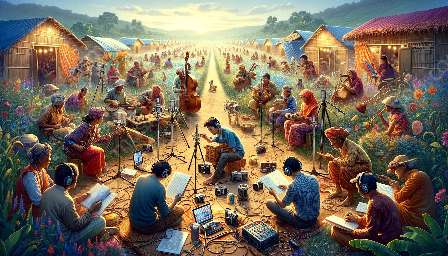Traditional music represents the cultural heritage and identity of a society, and its representation and dissemination are profoundly influenced by power dynamics. In the context of ethnomusicology and fieldwork, the role of power is evident in the construction of narratives, the preservation of traditions, and the impact of global influences on local music. This topic cluster explores the complex interplay between power dynamics and traditional music, shedding light on the ways in which these dynamics shape the field of ethnomusicology.
Understanding Power Dynamics in Ethnomusicology
In the realm of ethnomusicology, power dynamics play a significant role in shaping the representation and dissemination of traditional music. Researchers and scholars must critically examine the power structures that govern the study and interpretation of traditional music. Power differentials between researchers and the communities they study can significantly impact the representation and dissemination of traditional music. Furthermore, the influence of academic institutions, funding bodies, and industry interests can also shape how traditional music is portrayed and shared.
Fieldwork in Ethnomusicology: Uncovering Power Dynamics
Fieldwork in ethnomusicology provides a unique vantage point for understanding power dynamics within the context of traditional music. Ethnomusicologists engaging in fieldwork often navigate complex relationships with the communities they study, which involves negotiating power differentials, ethical considerations, and the impact of their presence on local music traditions. The ways in which researchers navigate these power dynamics can significantly impact the representation and dissemination of traditional music.
Impact of Globalization and Colonization
The influence of power dynamics on traditional music extends to the impact of globalization and colonization. The dominance of global music industries and the historical legacies of colonization have profoundly shaped the representation and dissemination of traditional music. Power differentials between global centers of music production and local traditional music communities can lead to the marginalization and commodification of traditional music, altering its authentic representation and dissemination.
Challenges in Representation and Dissemination
The influence of power dynamics presents several challenges in the representation and dissemination of traditional music. These challenges include issues of authenticity, ownership, and the negotiation of cultural narratives. Power imbalances between different stakeholders, including musicians, researchers, audiences, and industry representatives, can impact the ways in which traditional music is represented and disseminated, leading to questions of agency, equity, and cultural preservation.
Empowering Traditional Music Communities
Amidst the influence of power dynamics, efforts are being made to empower traditional music communities in the representation and dissemination of their music. Collaborative and participatory research approaches in ethnomusicology prioritize the active involvement of traditional music communities in shaping the representation and dissemination of their musical traditions. By centering the voices and agency of traditional music communities, ethnomusicologists and practitioners seek to address power differentials and work towards more equitable and respectful representation and dissemination of traditional music.
Towards a More Inclusive Ethnomusicology
As the field of ethnomusicology continues to evolve, there is a growing recognition of the need to critically engage with power dynamics and work towards a more inclusive and ethical representation and dissemination of traditional music. Efforts to decenter hegemonic narratives, challenge exploitative practices, and promote diverse perspectives within ethnomusicology contribute to a more holistic understanding and appreciation of traditional music that takes into account the complexities of power dynamics.



































